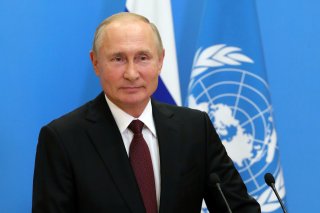Russia Demands Sanctions Relief to Save Faltering Grain Deal
A Russian official claimed that the UN promised to lift restrictions on Russian food exports as part of Moscow’s continued participation in the beleaguered deal.
The United Nations (UN) promised to lift restrictions on Russian food exports as part of Moscow’s continued participation in the beleaguered Ukraine grain deal, First Deputy Permanent Representative to the UN Dmitry Polyansky told Russian media.
"The UN promises us the result will be very soon. We will assess the efficiency of performing the Russian portion of the deal and results of relevant UN efforts when making the decision [to extend the grain deal],” said Polyansky, according to Russian state news outlet TASS. "The UN has time to honor assumed obligations until November 18—this date is set as ‘the logical deadline’ of the current deal," he added.
Reuters, citing “four sources familiar with the request,” reported last week that Russia is seeking the easing of restrictions on state agriculture lender Rosselkhozbank. Reuters noted that Moscow wants the West “to allow Rosselkhozbank to restore its relations with correspondent banks despite Western sanctions,” which would enable the institution to process payments for Russian foodstuffs.
The multilateral agreement for the export of grain out of designated Ukrainian Black Sea ports was signed by Russia, Turkey, Ukraine, and the UN in July. The agreement, commonly referred to as the Ukraine grain deal, came as a lifeline to Kyiv’s faltering economy and helped stabilize global food markets.
The grain deal is set to expire on November 19. UN chief Antonio Guterres called on the participating sides to take steps toward the agreement’s renewal. "I appeal to all parties to concentrate efforts in two areas. First, renewal and full implementation of the Black Sea Initiative. Second, removing the remaining obstacles to the exports of Russian food and fertilizer," he said earlier this month.
Russian president Vladimir Putin previously signaled his dissatisfaction with the deal, claiming that “almost all” of the grain shipped out of Ukraine through the maritime safe corridor is bound for Europe and not the famine-stricken developing states that the agreement was intended to help.
The Kremlin abruptly withdrew from the grain deal on October 29, citing a Ukrainian attack on Russia’s Black Sea Fleet in Sevastopol that same day. The deal was resuscitated in large part through emergency diplomacy conducted by Turkish president Recep Tayyip Erdogan, who secured Putin’s commitment to return to the agreement with wide-ranging guarantees intended to allay Russian concerns. Putin said in a government meeting last week that Russia reserves the right to exit the grain deal at any time if Ukraine violates the guarantees extended to Russia.
Mark Episkopos is a national security reporter for the National Interest.
Image: Reuters.

